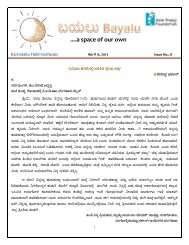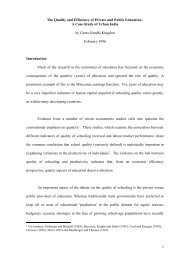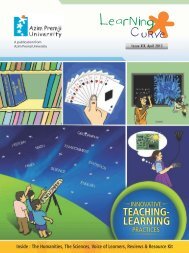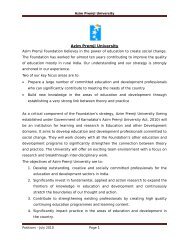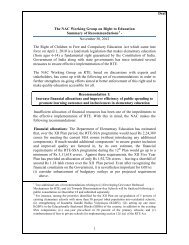Indesign Pagesnew.indd - Azim Premji Foundation
Indesign Pagesnew.indd - Azim Premji Foundation
Indesign Pagesnew.indd - Azim Premji Foundation
Create successful ePaper yourself
Turn your PDF publications into a flip-book with our unique Google optimized e-Paper software.
31<br />
Section E<br />
The Social Sciences—How Scientifi c Are They?<br />
Manas Sarma<br />
The social sciences are a very important and amazing<br />
fi eld of study. A division of science, social sciences<br />
embrace a wide variety of topics from anthropology<br />
to sociology. The social sciences cover a wide range of<br />
topics that are crucial for understanding human experience/<br />
behavior in groups or as individuals.<br />
By defi nition, social science is the branch of science that deals<br />
with the human facets of the natural world (the other two<br />
branches of science are natural science and formal science).<br />
Some social sciences are law, economics, and psychology, to<br />
name a few. The social sciences have existed since the time<br />
of the ancient Greeks, and have evolved ever since. Over<br />
time, social sciences have grown and gained a big following.<br />
Some colleges, like Yale University, have chosen to focus<br />
more on the social sciences than other subjects. The social<br />
sciences are more based on qualitative data and not as<br />
black-and-white as the other sciences, so even though they<br />
are more open to interpretation, the social sciences are still<br />
as scientifi c as the rest. Unfortunately, they have also not<br />
been as widely embraced as a science as natural science<br />
and formal science have, but are still as much a science as<br />
natural and formal science.<br />
Law is a good example of social science. There is a lot more<br />
to law than most people may think. Lawyers have to know<br />
all of the federal laws, all of the laws of the state they may<br />
be living in, strong communication skills, and a multitude<br />
of critical thinking. The amount of critical thinking alone<br />
required for studying law is enough to qualify as a science.<br />
Lawyers are required to have a great deal of understanding of<br />
a great deal of things. Even though lawyers are not required<br />
to know physics or chemistry or anything of the like, they<br />
are still as scientifi cally knowledgeable as, say, Isaac Newton<br />
or Madame Curie. That is,<br />
in their own way.<br />
A better example of a social<br />
science than law may be<br />
economics. economics<br />
is, in a word, fi nances.<br />
Economics is the study<br />
of how money changes, the rate at which it changes, and<br />
how it potentially could change and the rate at which it<br />
would. Even though economics does not deal with science<br />
directly, it is defi nitely equally scientifi c. About 50-60% of<br />
colleges require calculus to study business or economics.<br />
Calculus is also required in some science fi elds, like physics<br />
or chemistry. Since economics and science both require<br />
calculus, economics is still a science.<br />
Perhaps the most scientifi c of the social sciences is<br />
psychology. Psychology is the study of human behaviors,<br />
how they change, mental disorders, and basically covers<br />
everything from how people behave to the emotional side of<br />
people. The fi eld of psychology deserves as much credit as<br />
a science because of all that is required to study it. To study<br />
psychology requires biology, chemistry, and statistics, and<br />
also an advanced psychology class. Biology, chemistry, and<br />
(sometimes) statistics are also required in many science fi elds<br />
like engineering. With the common ground of requirements<br />
that psychology and science share, psychology is every bit<br />
as much a science fi eld as actual science fi elds are.<br />
The social sciences are a very important and amazing part of<br />
life and the world around us. While they are not as scientifi c<br />
and may be more abstract, the social sciences should still<br />
be more embraced than they are, because only by knowing<br />
people can you know the world around you.<br />
Manas Sarma was born in 1994 in Lowell, Massachusetts. Currently in 11th grade at Shrewsbury High school,<br />
he now resides in Shrewsbury, Massachusetts with his parents and younger brother. His favorite activities are<br />
playing outside with friends when weather-permitting and watching his favorite sitcoms “George Lopez” and “The<br />
Big Bang Theory.” He can be reached at mnsarma@hotmail.com<br />
Pg No: 136






